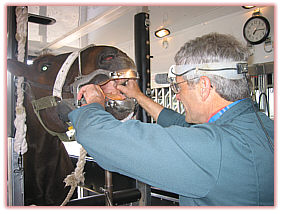Routine Dentistry

Horses need regular preventive dental maintenance every six months to one year. Unlike people, horses' teeth continuously erupt throughout their lifetime at a rate of two-three mm per year. The teeth should wear in correspondence to yearly eruption rate. Improper position of the teeth or improper wear patterns can lead to many health issues and behavioral problems.
Identifying dental problems as early as possible is important. We recommend yearly oral examinations and teeth floating of all horses starting at 1 year of age and continuing throughout their lifetime. Often times horses with oral and dental problems will display no symptoms, so the only way we have of identifying and managing problems is by yearly evaluation.
An oral examination consists of a basic physical examination. Then the horse will be sedated and a mouth speculum inserted in the mouth to keep the mouth open and allow thorough evaluation of the teeth and soft tissue in the mouth. Sedation is a must for a complete and accurate evaluation. Problems can then be identified and corrected. "Floating" of the teeth consists of grinding the tooth enamel to reduce sharp points that often develop on edges of the cheek teeth. Uneven tooth surfaces can also be reduced.
We offer routine oral examinations and teeth floating. We use power instruments and hand tools. We offer radiography of the skull and teeth for diagnosis of oral problems. We can perform minor tooth extractions, including wolf teeth. Major extractions are referred to an equine surgeon.
Symptoms that may indicate an oral problem include.: loss of food while eating; eats hay before his grain; grain in water bucket; difficulty chewing or excess salivation; loss of body condition; large undigested food particles in manure larger than one quarter inch; head tilting or tossing; bit chewing; tongue lolling; tries to rear while bridling; fighting the bit or resisting the bridle; bucking or failing to stop or turn; foul odor from the mouth or nostrils; traces of blood in the mouth; or nasal discharge or swelling of the face. Other horses may not show noticeable signs, because they just simply adapt to their discomfort.
|